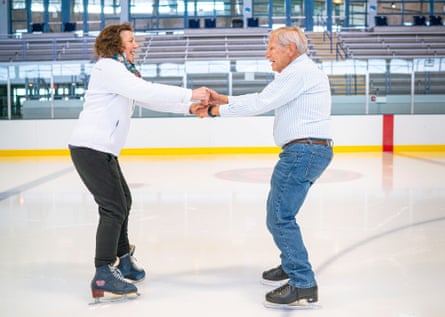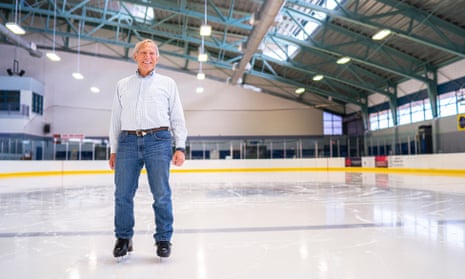The first time Richard Epstein went to his local ice-skating rink in Santa Fe, New Mexico, he was handed a free pair of skates. They had been left behind by a discontented customer. “I do things out of my comfort zone, and good things happen,” he observes.
This wisdom was borne out last December, when Epstein, now 78, skated in his first exhibition. His wife filmed his routine, which he performed with his coach, Teri Moellenberg, then his eldest daughter posted it on Twitter, along with a note that Epstein has stage four prostate cancer. Nearly 3 million people viewed it. Epstein is somewhat baffled by the response, describing himself as “just an old guy going around in circles”.
My father is 77 years old and has stage 4 prostate cancer. He decided to learn how to ice skate a few years ago, and just did this performance with his teacher.
— Rebekah Bastian (@rebekah_bastian) December 9, 2021
For anyone that thinks it’s too late to try something new… ❤️ pic.twitter.com/0SZ3FmbNGE
Often, when he drives to the rink, as he does three times a week, he reminds himself that good things follow discomfort. He always feels “a little anxious … Am I going to stumble? There is a risk of failure that I have to get over and work through – a barrier,” he says, beyond which lies “the feeling of being well, having accomplished something, feeling a little proud of myself”.
As a child, Epstein was “really terrible” at sports. He still feels embarrassed that he couldn’t throw a ball straight. “I’m an active person but one of the world’s worst athletes. I don’t have this ‘used to be good’ mentality,” he says. What he does have is a long personal and professional history of embracing mistakes, and uncertainty.

At high school, Epstein was streamed in “the medium track”. (“Don’t expect too much from these kids!” he giggles.) However, when he studied physics in college, the world and his own place in it began to make sense. “It gelled – it’s who I was.”
A research physicist with stints at the Harvard-Smithsonian Center for Astrophysics and the Nordic Institute for Theoretical Physics, Epstein is now an unpaid research professor at the University of New Mexico. He has published 200 technical papers and worked for the past two decades on a refrigerator that can reach very low temperatures with no vibration. He hopes to reach “a major milestone” in this project in the next year. Somehow, he retains a “fading” sense of not fitting in.
“I guess – to put things into some context professionally – I’m dyslexic. Totally poor memory,” he says. He has “mental scaffolding to compensate … It’s fun to find our individual approaches to make sense of the world.”
He used to look back at his childhood self, and think that one day he would feel “relaxed and cool and comfortable in my own skin … I’m still waiting,” he says with a chuckle.
Maybe ice-skating compensates for clumsiness in childhood? Epstein has also tried snowboarding, rock climbing and inline skating, all of which challenge balance. He insists he doesn’t mind falling, though these days he wears pads at the rink.
Did the response to his exhibition video make him feel more connected? “It didn’t really make me feel: ‘Oh, I’m accepted now,’” he says. “I wasn’t really trying to relate to people – I was trying to relate to my daughters.”
As a scientist, he has always committed to projects with uncertain futures, and worked fruitfully in that unmapped space. The word he comes up with to describe his scientific style (and perhaps he would say it applies to the rink too) is “bumbling”.
“That’s my biggest skill,” he says, and, although this sounds modest, it does not speak of ineffectualness so much as a deep love of exploration uninhibited by fear of failure. Epstein enjoys how the ice “takes me out of my ordinary ways”. There’s “the wind blowing through my hair. It is a joy to glide and turn, to get on the inside edge of the skate – that feeling of a centrifugal force.”
He is receiving treatment for chronic lymphocytic leukaemia as well as prostate cancer, and, while he experiences no “unpleasant symptoms or side-effects”, the illnesses are “a strong reminder of mortality”.
For now, he hopes the refrigerator “could be a big deal”, and that he manages to perfect his “three turn”, so called because the blade carves a 3 into the ice. “That would be, to me, a very significant step forward.”
